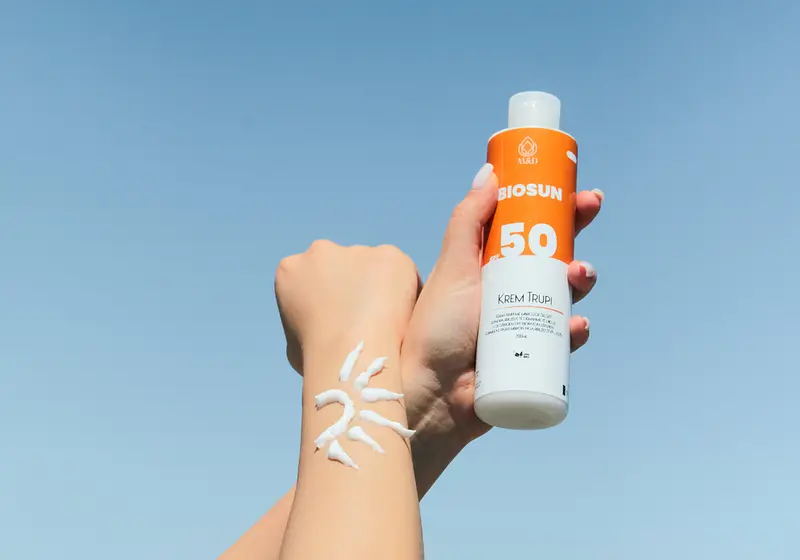Sunscreen is a product designed to protect our skin against sun rays. The ultraviolet radiation of sunlight may cause skin damage and even skin cancer. In the modern age, applying sunscreen is essential due to global warming, and this is a must for skincare.
Sunscreen involves chemicals and drugs penetrating the skin to give protection, especially in the summer. These are also available in physical (mineral) sunscreen.
Let us slide into your dms 🥰
Get notified of top trending articles like this one every week! (we won't spam you)How Sunscreen Works
Sunscreen helps reduce the chance of sunburn, pigmentation, dark spots, wrinkles, and skin cancer caused by skin explosion due to sun radiation. It comes in various forms, such as creams, lotions, gels, and sprays, and it has sun protection factors (SPF).

The Effects of UV Radiation
- UVA radiation from the sun can cause serious damage to the skin, such as pigmentation, wrinkles, dark spots, skin redness, and skin cancer.
- UVB radiation from the sun can also destroy the outer layer of the skin, causing skin burns and skin cancers.
Take the Quiz: Do you have sensitive skin?
Play this quiz to find out what kind of skin you have!
Pros
1. Prevents Skin Cancer
Sunscreen helps reduce the risk of developing skin cancer such as melanoma, known as a deadly skin cancer type. Sunscreen blocks UVA and UVB radiation from entering the skin and protects our skin from cell damage that may lead to skin cancer and other deadly skin diseases.
2. Prevents Premature Aging
Exposure to UVA rays causes the breakdown of collagen and elastic fibers, leading to skin diseases like wrinkles. Sunscreen blocks UVA rays from entering the skin and protects the skin from wrinkles, providing a shielding effect from damaging radiations from the sun. It also gives our skin a youthful appearance
3. Protects Against Sunburn
UVB rays damage the skin's outer layer, cause overexposure, and lead to sunburn. Using sunscreen develops a protective barrier around the skin and blocks UVB rays from entering your skin.
4. Prevents Hyperpigmentation
Sunscreens help minimize the risk of uneven skin hue, dark spots, and hyperpigmentation. It blocks radiation, preventing it from passing over the skin's internal and outer layers.
5. Improve Skin Texture
The sun can make our skin become rough, dull, and tan. Sunscreen helps to make our skin soft and smooth by protecting our skin from UV rays from the sun.
6. Provides Moisture
Sunscreens include ingredients that hydrate our skin and provide moisture. Dry skin has more risk of getting damaged, so keeping the skin moisturized can help prevent sun damage.

Cons
1. May Cause Allergic Reactions
Applying sunscreens on sensitive skin may cause skin irritation, skin redness, and itching due to the chemical ingredients used in the sunscreen. This experience affects people with sensitive skin and also those with tougher skin.
2. Can Clog Pores
Some sunscreens, which are heavy and oily, may block pores with lead acne and other skin problems. This is because it fills the open pores of sebaceous glands, and acne starts on the face. In this oily skin type, people have to use sunscreen in low amounts. People who are already facing acne should avoid its use.
4. Environmental Damage
Sunscreen has some chemical constituents like oxybenzone and octinoxate that pollute the environment. When we use sunscreen while swimming in oceans, it disturbs the marine life. The chemicals used may increase the death rate of aquatic bodies. In simpler terms, sunscreen could pollute the environment and even bleach reefs.
5. Hormonal System Disturbance
Sunscreen may cause hormonal changes. Chemical constituents like oxybenzone and octinoxate may enter our body and cause a series of hormonal disturbances. This may cause the overproduction of hormones and diseases. The endocrine system got disturbed and led us to viral infections.
6. DNA Coral Damaging
Oxybenzone can damage DNA coral, present in all common sunscreens. This may lead to diseases and also shorten our life span. Sometimes, overuse of sunscreen could cause genetic disorders.
7. Vitamin D Deficiency
Sunscreen blocks the sun's rays, which are helpful for our body causing Vitamin D deficiency to bone problems such as rickets. Although sunlight is worst for us in large amounts, a lack of sunlight could still cause issues.
8. White cast
Sunscreen leaves a white cast on the skin, seen so clearly on the dark tone skin type. It takes a long time to become light and faint and could leave a negative impression on people.

Conclusion
While sunscreen has pros and cons, it protects us from sunburn, skin cancer, hyperpigmentation, and other diseases. Without it, we cannot maintain healthy skin. If we use sunscreen with natural elements, it will not affect our skin as much.
These elements include zinc oxide, titanium dioxide, Aloe vera carrot seed oil, etc. However, choosing sunscreen suitable for your skin type may reduce the chances of acne and other side effects.








